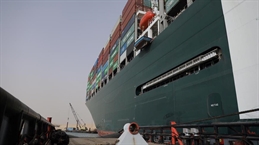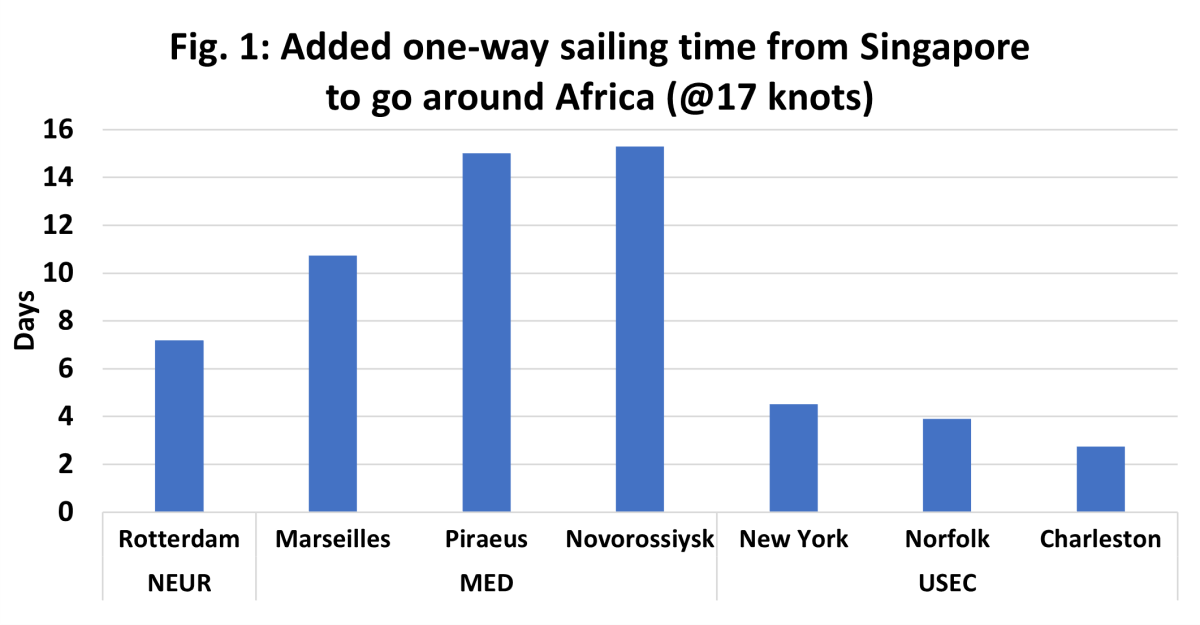
The recent Suez Canal blockage has the potential to cause "severe capacity issues" according to maritime analyst, Sea Intelligence which released the report on Sunday, prior to the news that the vessel has been refloated on Monday evening.
"As the Suez Canal continues to remain blocked due to the grounding of Ever Given, it has the potential to cause severe capacity issues [and] the impact an extended blockage could have on global capacity," the Denmark-based agency said.
In a statement, it said as a starting point, the analysis looked at the added sailing distances and transit times in a one-way direction if the carriers re-route their vessels from Asia south of Africa, for destinations to North Europe, Mediterranean, and to US East Coast.
"Assuming vessels sailing at 17 knots, one week would be added from Singapore to Rotterdam, 10 days to West Mediterranean, and a little over two weeks to East Mediterranean. On Asia to US East Coast (USEC), roughly 2.5-4.5 days will be added to the head-haul sailing times," said Alan Murphy, CEO, Sea-Intelligence. "With this, we can calculate the impact on global capacity."

Murphy noted that "presently, the global fleet has a nominal capacity of 24.4 million TEU" and with a rough approximation of 80% time spent at sea, the global fleet has a "production capacity" of 19.6 million TEU slots per day, or 19.6 million TEU*days.
The longer sailing times would necessitate an extra 14.4 days round-trip to North Europe and 26.8 days to the Mediterranean, Sea Intelligence said, noting that this adds a capacity requirement of 1 million TEU*days to move the longer distances. Adding the Asia-US East Coast cargo to that, we end up with another 108,000 TEU*days.
"All in all, Sea Intelligence noted that in order to re-route the cargo around Africa or through Panama in some cases for the Asia-US East Coast – this will absorb an amount of carrying capacity equal to 6% of the globally available capacity," Murphy said.
He noted that converting this into a nominal fleet equivalent, then 6% of the global fleet is equal to 1.48 million TEU of capacity – the same as 74 ultra-large 20,000 TEU container vessels.
Capacity shortages from prolonged blockage cited
"It is evident that such an amount of capacity absorption will have a global impact and lead to severe capacity shortages. It will impact all trade lanes, as carriers will seek to cascade vessels to locations where they find they have the greatest need," the Sea-Intelligence chief noted.
In the short term, he said it is not possible to build more vessels to solve the problem – and the only viable option would be to speed up the vessels.
"This can partially alleviate the problem, but far from solve it. In this case, increasing speed from 17 to 20 knots would reduce the impact on the global fleet from 6% to 5.2%. Going full throttle at 22 knots would still only reduce the impact to 4.8%," Murphy said.



